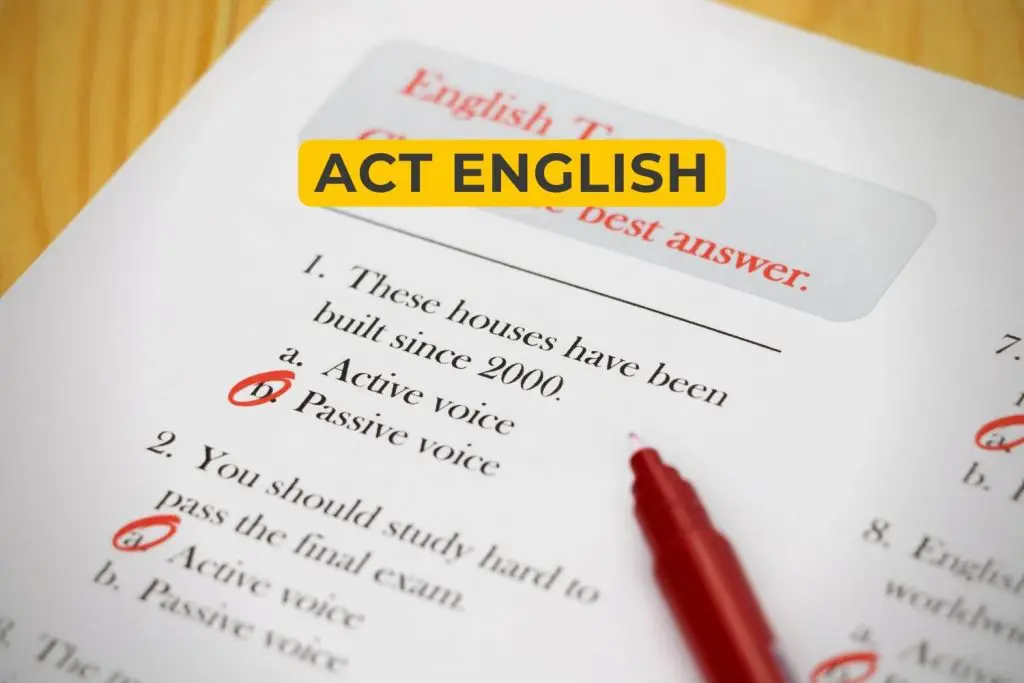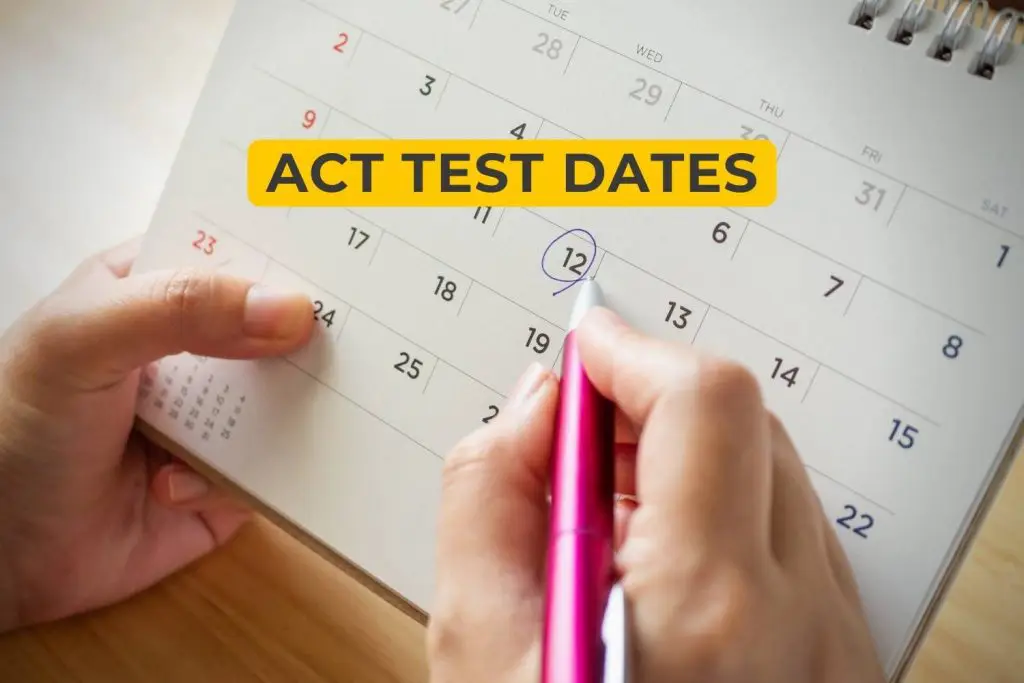
The ACT practice test will help you prepare for the actual ACT test used for college admissions and scholarship applications. These practice tests will measures the knowledge and ability learned in high school. All ACT prep tests are 100% free with no registration or sign up required.

DISCLOSURE: This post may contain affiliate links, meaning when you click the links and make a purchase, we receive a commission.
Our practice tests contain four sections as per official ACT pattern: English, math, science, and reading.
Part of thorough preparation for the ACT is taking practice tests. What are the practice tests? ACT practice exams are exercises that contain questions that mimic those in the real ACT. They have been designed to measure the ability and learning that you have studied in high school. They’re close to being real ACT tests, but they are not. The purpose of ACT test prep is to help you prepare for the test day so that you can get a good score, be accepted in your chosen college and earn a scholarship.
Studies have shown that performing exercises is one of the most effective ways to prepare for an exam. While the focused study in high school remains to be the best method to ace the ACT, your chances of achieving a greater score bode better if you take ACT prep. Check also our Best ACT Prep Course here.

Familiarize yourself with the test structure. Ease your examination anxiety by knowing what to expect during the test.
Time yourself. Performing exercises will test whether you’re ready to take the actual 3-hour long test, so it is important to also time yourself when answering ACT tests.
Use as a diagnostic tool. Practice tests will tell you which sections you want to improve on. Make a note of your mistakes and include these sections in your learning plan. Most exercises will have an answer key.
Go back to your wrong answers. After reviewing, take the examination again and see if you can answer items you’ve missed correctly. This will tell you if your studying strategy has helped you improve your performance.
Remember what you have learned. ACT prep tests should be used alongside your ACT review materials and classes. Putting your new learning and ability into practice will aid you better remember what you have studied.
The ACT also includes an optional essay. The ACT takes three and one half hours with this section or three hours without this section. It has a sum of 215 questions. Many test-takers feel the allocated time isn’t enough, but this depends on the level of your learning and ability, plus your familiarity with the examination structure and rules. Again, this is where exercises can help you.
| Test | Number Of Questions | Time | Description |
| English | 75 | 45 min | Multiple-choice questions for grammar and usage. |
| Math | 60 | 60 min | Multiple-choice questions – Math |
| Reading | 40 | 35 min | Multiple-choice questions – reading comprehension |
| Science | 40 | 35 min | Multiple choice questions – data interpretation |
| Writing | 1 essay | 40 min | Optional. One 1-4 page essay |
| TOTAL | 215 | 2 hours 55 min | |
| With essay | 215 + essay | 3 hours 35 min |

ACT English has 75 questions that you need to finish within 45 minutes. This examination has five passages that test your standard English skills, including punctuation, usage, and sentence structure, production of writing and knowledge of the language.
Categories:
The ACT Math has 60 multiple-choice questions that you need to answer within 60 minutes. It tests math skills that were taught in grade 12. You will be asked to solve math problems that may require learning of basic computation and formulas. Test-takers are allowed to use a calculator, as long as it follows the ACT Calculator Policy.

The ACT Reading Exam has 40 multiple-choice questions on reading comprehension that you need to complete within 35 minutes on the test day. It has four sections, with three long passages and another section with two shorter passages. Each passage has one heading with the author’s name, type of passage, and also an introduction that will aid you better understand the passage.
Vocabulary words that are excluded in the passages and logic rules are excluded in the examination. Instead, you will be asked to analyze the author’s points of view, compare details, understand the logical sequence of events, understand cause-and-effect relationships, and point out the main ideas.
You can also visit our post here for some ACT Reading Tips.
Categories:
Check our website here: ACT Registration And Requirements
The ACT Science test has 40 multiple-choice questions that you need to answer in 35 minutes on examination day. The examination checks your ability to interpret, analyze, evaluate, and solve problems related to natural science. You will be presented with scientific information in forms of data representations, summaries of research, or conflicting views.
The examination comprises high-school level subjects such as earth science, physics, biology, and chemistry. It consists of six or seven passages with five to seven questions each with accompanying graphs, figures or tables.
Categories:
The ACT test of a student is scored out of 36 points. Each test section is also scored out of 36 points, and the composite or the average of these ACT scores will be the overall score. The average scores are taken to show how you performed on the test compared to other test-takers.
The examination doesn’t take points off for incorrect answers, so you should always guess even if you are not sure. The essay is also scored out of 36 points. But, because this section is optional, it is not included in the composite ACT score. The score of a test-taker is based on organization, language, ideas, and analysis, as well as development and support.

The ACT test dates are generally on Saturdays, but you may be able to take the examination on a different date if you have a religious exemption or are taking the test’s special administration. Many students schedule their date in the fall of their junior year. After receiving their initial test scores, as well as reflecting on the experience, students will take the examination in the next few months to improve areas of weakness.

To increase your chances of scoring higher, it is recommended that you review for the ACT and take exercises. Exercises are designed to help you become familiar with the test structure, review contents that might appear on the examination, and exercise answering them within a time limit. It gives you the chance to assess your ability even before the examination, so you’ll know which weak areas to focus on once you start reviewing.
It is highly recommended that students should have full-length ACT practice tests because:
The scores from the practice questions help you understand your strengths and weaknesses. The exercise test scores also reveal the areas that require improvement as well as the areas in which the student already has a strong foundation. This way, the student can create a more effective plan by focusing on sections of improvement that will increase his score, rather than paying particular attention to areas the test-taker already knows.
While students may have a vigorous understanding of the examination content and successfully apply their learning to preparatory questions during tutoring sessions, ACT-practice-tests give students an opportunity to use their test-taking skills under the actual conditions of the ACT test. The practice test imitates the real conditions present in an official test so students can boost their test-taking skills.
Our practice questions build focus and confidence of students for the official test. Exercise test also gives test-takers a chance to practice what they have already studied. Some students will take an exercise examination before they start a prep program to acquire a baseline score so they’ll know their starting point. Then, they will take the exercise examination during the middle of the program, and more than one mock test at the end of the program as a final exercise for the official test.